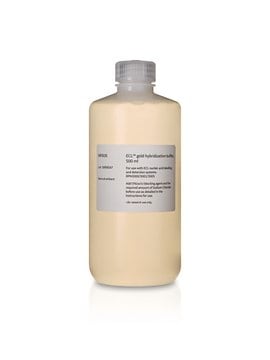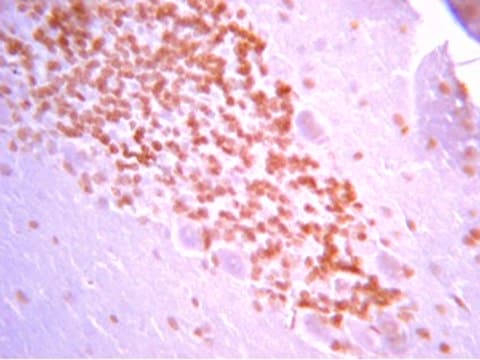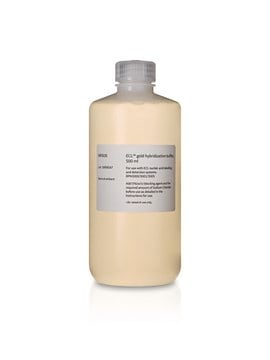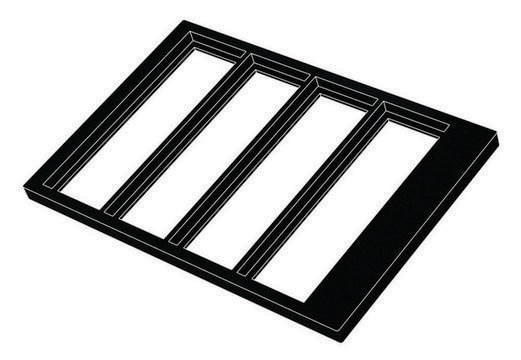GERPN3001
ECL™ Direct Nucleic Acid
Cytiva RPN3001, pack of 1 ea
Se connecterpour consulter vos tarifs contractuels et ceux de votre entreprise/organisme
About This Item
Code UNSPSC :
41105300
Nomenclature NACRES :
NA.31
Produits recommandés
Conditionnement
pack of 1 ea
Fabricant/nom de marque
Cytiva RPN3001
Température de stockage
2-8°C
Catégories apparentées
Description générale
ECL™ Direct Labeling and Detection System.
Application
ECL™ Direct Nucleic Acid Labeling and Detection Systems are based on the direct labeling of DNA or RNA probes with horseradish peroxidase (HRP) in a simple 20 min chemical reaction. The resulting probe can be used without purification. Detection is achieved by generation of light via the HRP-catalyzed breakdown of luminol.
Each system includes the following reagents, sufficient for labeling 5 to 10 μg nucleic acid and detecting 2000 to 4000 cm2 of membrane (depending on product ordered): labeling reagent, crosslinker, control DNA, blocking agent, ECL™ Detection Reagents, and ECL™ Gold Hybridization Buffer.
Each system includes the following reagents, sufficient for labeling 5 to 10 μg nucleic acid and detecting 2000 to 4000 cm2 of membrane (depending on product ordered): labeling reagent, crosslinker, control DNA, blocking agent, ECL™ Detection Reagents, and ECL™ Gold Hybridization Buffer.
Caractéristiques et avantages
- Direct probe labeling in a 10 min reaction, 1 h from hybridization to detection with ECL™ Direct, Hybond® N+, and Hyperfilm ECL.
- Eliminates handling, waste, and regulatory issues associated with the use of radioactivity.
- No need to strip blots before reprobing.
- For fast and easy detection of medium- to high-target amounts in applications such as colony/plaque screens, dot blots, and PCR product analyses.
- Consistent results combining strong signals with very Low backgrounds.
Stockage et stabilité
Please be aware this product may be shipped 90 days before the expiration date. For more information on the batch specific expiration date, please contact technical service.
Remarque sur l'analyse
To view the Certificate of Analysis for this product, please visit www.cytiva.com.
Informations légales
ECL is a trademark of Cytiva
Hybond is a registered trademark of Cytiva
Produit(s) apparenté(s)
Réf. du produit
Description
Tarif
Mention d'avertissement
Danger
Mentions de danger
Conseils de prudence
Code de la classe de stockage
12 - Non Combustible Liquids
Certificats d'analyse (COA)
Recherchez un Certificats d'analyse (COA) en saisissant le numéro de lot du produit. Les numéros de lot figurent sur l'étiquette du produit après les mots "Lot" ou "Batch".
Déjà en possession de ce produit ?
Retrouvez la documentation relative aux produits que vous avez récemment achetés dans la Bibliothèque de documents.
Shin-Ichi Miyata et al.
Microbiology (Reading, England), 149(Pt 8), 2243-2250 (2003-08-09)
Thymidylate kinase (TMK) catalyses the phosphorylation of dTMP to form dTDP in both the de novo and salvage pathways of dTTP synthesis in both prokaryotes and eukaryotes. Two homologues of bacterial thymidylate kinase genes were identified in a genomic library
Senia Rosales et al.
BMC microbiology, 10, 208-208 (2010-08-04)
Tuberculosis persists as a public health problem in Honduras. A better knowledge of the molecular characteristics of Mycobacterium tuberculosis strains will contribute to understand the transmission dynamics of the disease within the country. The aim of this study was to
C Couturier et al.
Arteriosclerosis, thrombosis, and vascular biology, 20(12), 2559-2565 (2000-12-16)
Type II secreted phospholipase A(2) (sPLA(2)) releases precursors of important inflammatory lipid mediators from phospholipids. Some observations have indicated that the sPLA(2), which has been implicated in chronic inflammatory conditions such as arthritis, contributes to atherosclerosis in the arterial wall.
C Martins et al.
Genome, 44(5), 903-910 (2001-10-30)
To address understanding the organization of the 5S rRNA multigene family in the fish genome, the nucleotide sequence and organization array of 5S rDNA were investigated in the genus Leporinus, a representative freshwater fish group of South American fauna. PCR
C Couturier et al.
The Journal of biological chemistry, 274(33), 23085-23093 (1999-08-07)
Type II-secreted phospholipase A(2) (type II-sPLA(2)) is expressed in smooth muscle cells during atherosclerosis or in response to interleukin-1beta. The present study shows that the induction of type II-sPLA(2) gene by interleukin-1beta requires activation of the NFkappaB pathway and cytosolic
Notre équipe de scientifiques dispose d'une expérience dans tous les secteurs de la recherche, notamment en sciences de la vie, science des matériaux, synthèse chimique, chromatographie, analyse et dans de nombreux autres domaines..
Contacter notre Service technique









